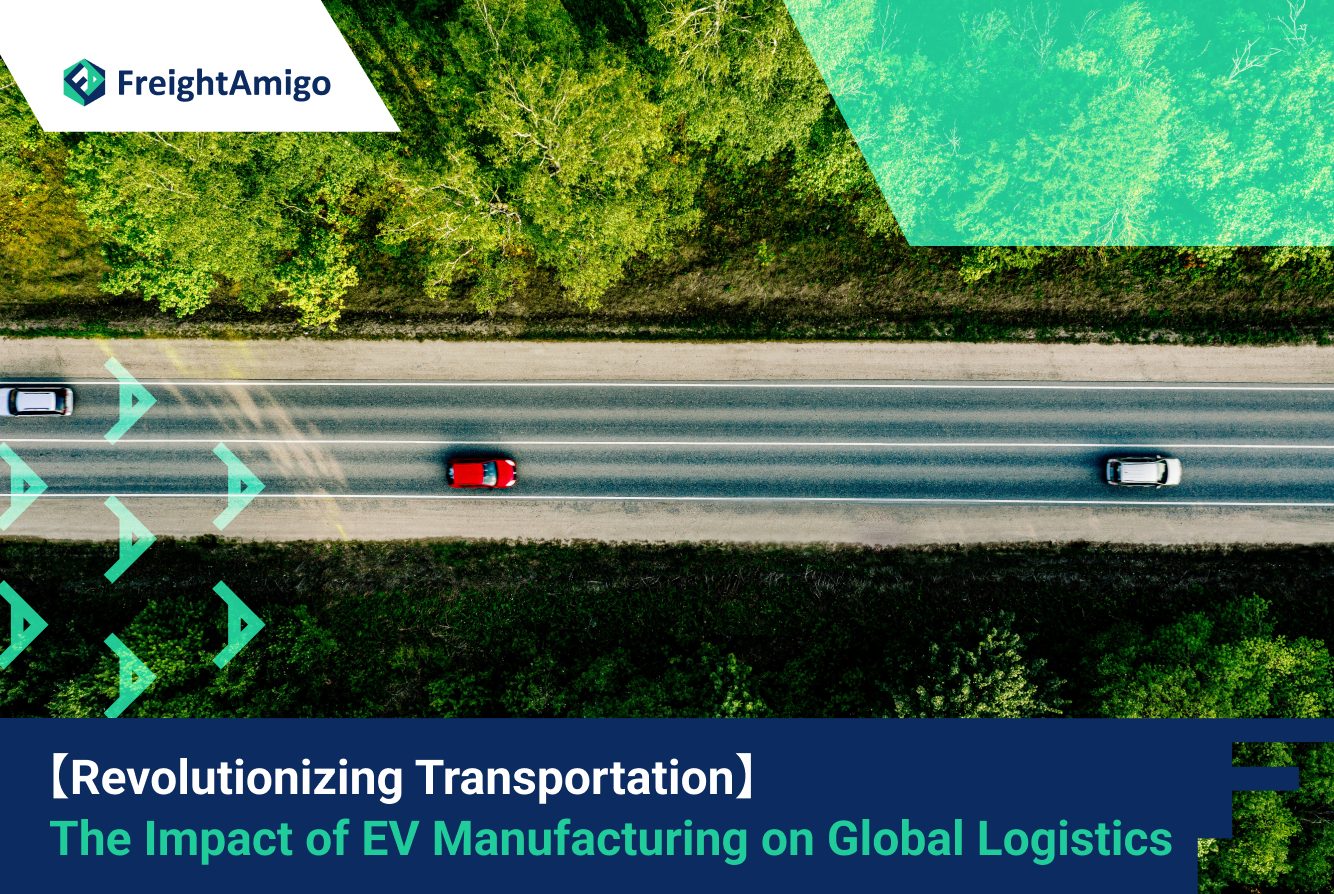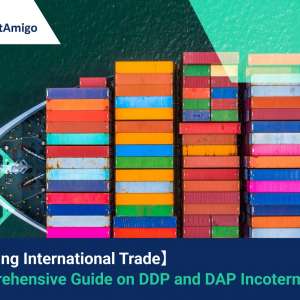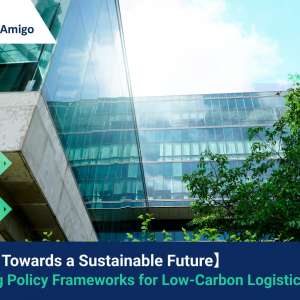Author Name: Tiffany Lee – Marketing Analyst at FreightAmigo
The world of transportation is witnessing a paradigm shift, led by a surge in Electric Vehicle (EV) manufacturing. The emergence of EVs is not merely a shift from fossil-fuel-powered vehicles to electric ones; it represents a significant transformation in the entire automotive industry, impacting every aspect from design and performance to manufacturing and logistics.
EV manufacturing is unique due to its reliance on a different set of components and materials compared to conventional vehicles. Most notably, the electric vehicle battery, which is the heart of every EV, requires rare earth metals and complex manufacturing processes, thus transforming the traditional automobile supply chain.
The rise of EV manufacturing is disrupting the status quo, ushering in a new era of transportation. The implications, however, go far beyond the vehicles themselves. The impact is felt across the entire global logistics landscape, revolutionizing the way goods are moved, stored, and transported.
想即時比較國際快遞、空運、海運、鐵路貨運及貨車物流管理方案以控制運輸成本?
The Rise of Electric Vehicles and Its Impact on Global Logistics
The exponential growth in the production and adoption of EVs has had a profound effect on global logistics. The electric vehicle supply chain, unlike its traditional counterpart, is more complex and diverse. From the mining of rare earth metals for electric car battery manufacturing to the assembly of EV components, every stage requires specialized handling and transportation.
The complexity of the EV supply chain has necessitated new logistics strategies and infrastructure. For instance, the transportation of lithium-ion batteries, which are integral to EVs, requires stringent safety measures due to their volatile nature. This has led to the development of specialized packaging and transportation rules, impacting the logistics sector.
Beyond the intricacies of the supply chain, the rise of EVs is fostering a broader transformation in global logistics. As more businesses opt for electric fleets to reduce their carbon footprint, there is a growing demand for charging infrastructure. This shift is driving significant changes in the design and operation of logistics facilities, such as warehouses and distribution centers.
Understanding the EV Supply Chain
The EV supply chain is a complex web of processes and activities, spanning across multiple continents. At the heart of this chain is EV manufacturing, which is reliant on a diverse range of materials and components.
The electric vehicle battery is arguably the most critical component of the EV supply chain. Its manufacturing process involves the sourcing of rare earth metals like lithium, cobalt, and nickel, which are predominantly mined in regions like Africa, Australia, and South America. These materials are then transported to battery manufacturing centers, primarily located in Asia, Europe, and North America.
Beyond the battery, other components like electric motors and power electronics also form a significant part of the EV supply chain. These components require a variety of materials, including copper, aluminum, and various semiconductor materials. The procurement and transportation of these materials add further complexity to the EV supply chain.
The Challenges of the EV Supply Chain
The EV supply chain, while promising, is not without its challenges. The complexity of the supply chain, coupled with the rapid pace of EV manufacturing growth, presents several logistical hurdles.
One of the significant challenges is the transportation of lithium-ion batteries. Due to their volatile nature, these batteries require specialized handling and stringent safety measures during transportation. This not only increases the logistical cost but also necessitates specialized knowledge and training for logistics personnel.
Another challenge lies in the procurement of raw materials. The sourcing of rare earth metals, which are crucial for electric car battery manufacturing, is concentrated in a few regions. This geographical concentration results in logistical complexities, price volatility, and supply chain risks.
Furthermore, the need for charging infrastructure adds another layer of complexity to the EV supply chain. The installation of charging stations requires careful planning and coordination, impacting the logistics sector’s operations and strategies.
The Future of EV Manufacturing and Its Potential Influence on Global Logistics
While the challenges are significant, the future of EV manufacturing holds immense potential for transforming global logistics. As the demand for EVs continues to rise, the EV supply chain will become more streamlined and efficient, driving innovation in logistics strategies and technologies.
One of the potential influences of EV manufacturing is the decentralization of the supply chain. As countries strive for energy independence and sustainability, there is a growing push towards localizing EV manufacturing. This shift will not only reduce the dependency on specific regions for raw materials but also foster the development of local logistics infrastructure and capabilities.
Additionally, the rise of EVs is likely to accelerate the adoption of digital technologies in logistics. From blockchain for supply chain transparency to AI for predictive logistics, the complex EV supply chain will require advanced technologies for efficient management.
How to Overcome the Challenges in the Electric Vehicle Supply Chain
Overcoming the challenges in the EV supply chain requires a multifaceted approach, involving innovation, collaboration, and strategic planning.
One of the key solutions is the development of alternative battery technologies. Research is underway to find alternatives to lithium-ion batteries that are less volatile and more environmentally friendly. This would not only simplify the logistics of battery transportation but also reduce dependency on rare earth metals.
Another strategy is to localize the EV supply chain. Governments and businesses can collaborate to develop domestic EV manufacturing capabilities, reducing the logistical complexities associated with global supply chains.
Lastly, digital technologies can play a crucial role in overcoming the challenges. Technologies like blockchain can provide transparency and traceability in the supply chain, while AI and machine learning can optimize logistics operations, making the EV supply chain more efficient and resilient.
Conclusion: The Ongoing Revolution in Transportation Through EV Manufacturing
The revolution in transportation brought about by EV manufacturing is reshaping the global logistics landscape. From the complexity of the electric vehicle supply chain to the challenges of electric car battery manufacturing, the impact is profound and far-reaching.
Despite the challenges, the future of EV manufacturing holds immense promise. As the world moves towards a more sustainable and carbon-neutral future, the role of EVs will only grow. This shift will continue to drive innovation and transformation in global logistics, creating a more efficient, resilient, and sustainable transportation ecosystem.
In this ongoing revolution, the role of stakeholders – from governments and manufacturers to logistics providers – is crucial. Through collaboration, innovation, and strategic planning, they can overcome the challenges in the EV supply chain, paving the way for a sustainable transportation future.
The journey is just beginning, but the potential is vast. The revolution in transportation through EV manufacturing is not just about new vehicles; it’s about a new world of possibilities for global logistics and beyond.









































